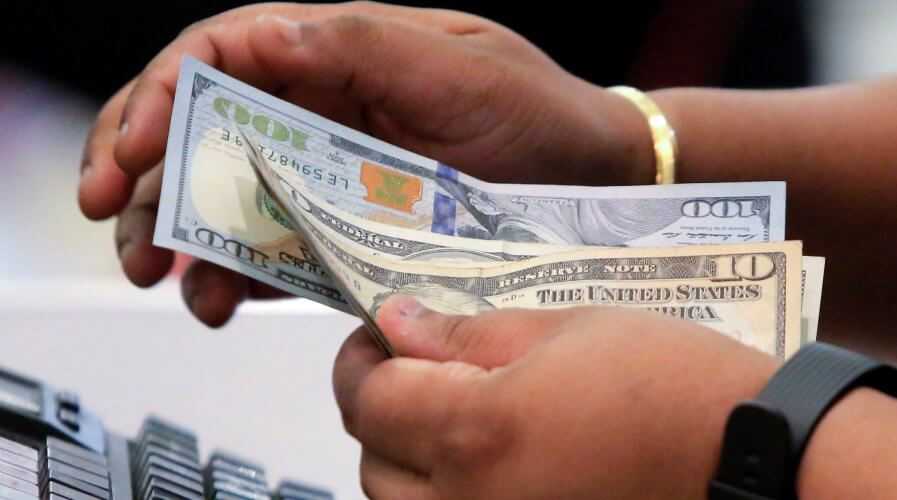
A cashier handles money in Macy’s Herald Square during early opening for the Black Friday sales in Manhattan, New York. Source: Reuters
Forter wants to boost fraud prevention for Asia Pacific e-commerce
Forter, the first e-commerce fraud prevention firm to provide real-time approve or decline decisions for all online transactions, is preparing to conquer the Asian market.
Co-founder and CEO Michael Reitblat, speaking to Tech Wire Asia at Web Summit, said he hadn’t decided on whether the company’s Asia headquarters will be in Hong Kong or Singapore, but he’s excited by the prospects e-commerce in Asia offers.
“Asia is way bigger on e-commerce than the US and it is certainly growing faster,” he said.
Last year, the startup processed more than US$20 billion in transactions and is hoping to have even bigger success in Asia Pacific.
The region, Reitblat said, is seeing increased cross-border trading, from Vietnam to China, with Singaporean startups selling pan-Asia. But demand for Forter’s services will likely come mostly from Asian e-sellers operating in Western markets.
“When Asian retailers sell to the Western world they need to abide by the local payment laws,” Reitblat said. “As they adopt these modern, or not necessarily modern, but Western technologies of e-commerce, they start facing the same risk problems.”
In Western countries, if online fraud occurs with a stolen credit or debit card, the merchant is the liable party.
According to Reitblat, this costs US merchants US$4 billion a year and non-US merchants lose another US$10 billion.

Michael Reitblat, CEO of Forter. Source: Forter
For example, he knows of a large merchant in the US who just sent US$100,000 worth of goods to Donald Duck in Texas. Because the retailer didn’t screen the sale, it resulted in a big loss for the company.
Combating this problem is costly business. But online retailers are also losing money from blocking suspected fraud that isn’t actually fraud. This loss is around US$20 billion a year in the US and an estimated US$100 billion globally.
Typically, Asian e-retailers are using people, data and simplified fraudster models to combat online fraud. But because labor is cheap in Asia, the costs for fraud prevention are not as high as in the West, but they are not as effective either.
For example, companies may build a tool internally as it’s cheaper and pay people to oversee it but the data availability in Asia is not as good as in the US, so the system is generally less efficient, he said.
“An Asian company showed me its team of workers and said ‘I can double the number of people I use because labor is cheap in Asia,’ it is not an issue,” Reitblat said.
“Then we showed the retailer the data of how many good transactions his team declines; this is something they care about. I am not trying to say people are not good enough, but it is not a fair fight. Personnel can’t leverage the data we have because they don’t have access to it,” he said.
Forter’s SaaS system reviews transactions live and uses an algorithm trained with human researched knowledge, as well machine learning. It uses this knowledge, along with 6,000 different data points to determine if a transaction is genuine or fraud. The company takes away any risk for retailers by offering a full guarantee. If the system fails, Forter pays, not the merchant.

Shopping should be a frictionless event for consumers. Source: Shutterstock
“Oftentimes, your best customers look like fraudsters because they buy a lot of expensive things and they ship it to expensive places, so it’s important to be able to differentiate between the two” Reitblat said.
In November, the company launched its new end-to-end solution to address policy abuse fraud, which it said has tripled in the past year according to its data. The new tool will alert people to retailers in real time to suspicious activity, like customers wearing clothes and sending them back, while blocking offending users.
The SaaS startup remains focused on solutions and continued growth. Last year, the company quintupled the number of merchants it works with, said Reitblat, and he is expecting similar numbers in 2018.
“There is a lot of growth we can do to really protect the whole ecosystem,” he said. “Fraud prevention shouldn’t be a competitive advantage of a retailer – it shouldn’t exist at all.”
READ MORE
- Strategies for Democratizing GenAI
- The criticality of endpoint management in cybersecurity and operations
- Ethical AI: The renewed importance of safeguarding data and customer privacy in Generative AI applications
- How Japan balances AI-driven opportunities with cybersecurity needs
- Deploying SASE: Benchmarking your approach






